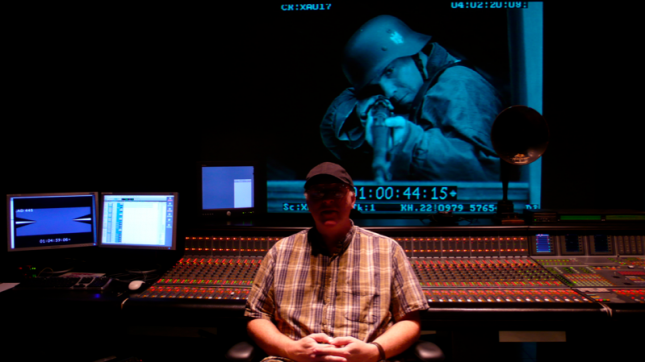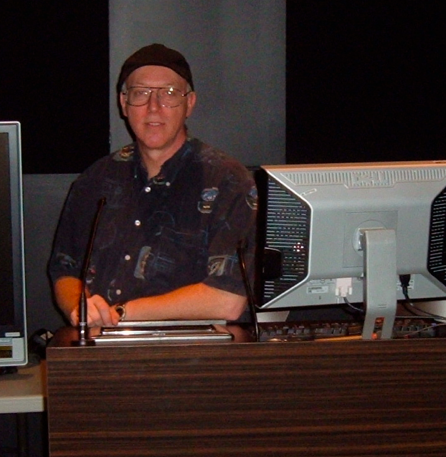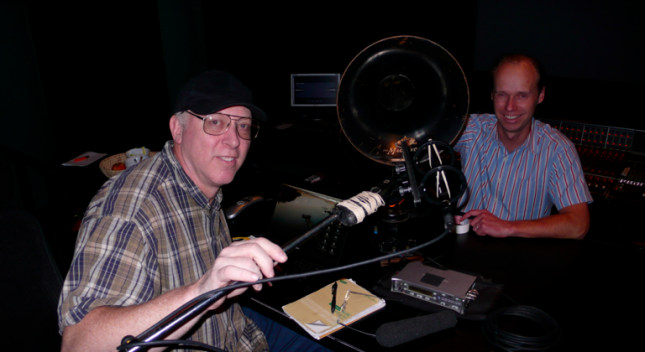
Let’s get started with this month’s special. Below is an interview I had with our guest Harry Cohen, talking about the general aspects of his career.
How did you get started in sound design and what’s been the evolution of your career?
I backed into sound design by accident; I showed up at EFX studios in Burbank to do some piano overdubs on a new-age-y album, and met the staff. They were a music studio just getting into post production. The owner asked me if I would help with some sound effects for game shows they were posting, since I knew synths pretty well. Three days later he asked me out of the blue if I was interested in trying my hand at doing sound fx for a film. (a super low-budget film !), and for better or worse , I agreed. I stayed with EFX for about 12 years, and slowly we built a reputation and started getting better films. Looking back , it was like a rare alignment of the stars or something; so many talented people were associated with that place. (Paul Menichini, David Farmer, Ann Scibelli, Tim Gedemer, Tim Walston, Mike Kamper, Gary Rizzo, Mark Fishman, and on and on). Later, I accepted an offer from from Wylie Stateman and Lon Bender to join Soundelux. Except for a 6 month period where I was ‘on loan’ to Soundstorm, those are the only 3 facilities I have worked for. I’ve been with Soundelux for more than 10 years now.
What are your biggest influences inside and outside the world of sound?
Well , of course , all the great sounding films over the years, and, all the other sound professionals I have worked with. Many people are so open and willing to share what they know, and that is probable the greatest resource we can tap.
I think also that being a musician has had a lot of influence on how I hear things.
 How you deal with deadlines and creativity? Is there any special method you have for staying creative?
How you deal with deadlines and creativity? Is there any special method you have for staying creative?
Aha ! Deadlines and creativity… I find that fear and panic have great effect on your productivity ! But seriously, my thoughts on it are that when you are crunched, you tend to work longer hours, and that after several hours of working with the problem and your material , something ‘clicks’ in your brain , and you go into this mode of being focused and productive. So often we go back to the stuff we did in a hurry when under time pressure , and realize that it is good ! Unfortunately, this is not a great way to work all the time; it tends to take a toll on your life. But I am not one who can be creative all the time; it comes and goes, and I have to take advantage of it when I am ‘in the mode’.
DS: What are your favorite tools in the studio and the field?
In the field , I love my Sound Devices 722. The small portable Zoom type recorders are also super convenient for casual and ‘stealth’ recordings. I have been doing most of my recording with either a Sennheiser 416 or 418; I also love the Neumann 190i. This year I intend to try some larger diaphragm mics. In studio, pro tools of course is the main platform, but I also work in Logic, Max msp, Reason, and other standalone programs. Kontakt has become an important tool for me.
DS: What’s your take on technology and how do you think it has affected the way you design sound today?
Well, looking back, I used a synclavier and a rack of outboard gear. Complex patch-ups were often hard to re-create. Now, if I need 3 more eqs and 2 more compressors, a couple of pitch shifters and some reverbs and delays, the computer isn’t even breathing hard. Also , there are constantly new plug-ins and
new sound technology coming out. I try to experiment with new stuff when I can.
How would you define sound design? What is the essence for you?
Sound Design has really come to mean two separate things. In the larger sense , a sound designer can be someone who is involved with the whole sound of the film; the creation or supervision of all the elements,(except the music) and how they fit together, the arc of the soundtrack, actively working with the mixers to realize the directors wants and vision for the film. But, it also means the guy(s) (or gals) that are tasked with creating and organizing the cool sounds themselves.
Much of what we need does not exist in the real world; or there is a creative ‘re-purposing’ of real world sounds to be something else. Its hard to be both of those people; they are both very time intensive. In practice, my work falls somewhere in between the two, which is to say that I am usually present during the mix to contribute a voice to the shaping of the track , and to manufacture lots of last minute adds and fixes.I do a lot of work with supervisor Wylie Stateman , and we tend to see a lot of things the same way, in terms of what we are trying to accomplish with the sound.

What have been your most challenging projects and why? Any favorites also?
Challenge can be lots of different things. Earlier this year I helped out on Green Lantern, doing the evil monster, his thrall, and any ‘evil energy’. My first day on the project was also the first day of predubs ! That was a particular kind of challenge. Each film presents its own challenges, and while that sounds like a cliche, it is very true. I once told Wylie that if I was really honest with a director at our first meeting, I would say that I have no idea what I am going to do for his film. The film will tell me what it needs……to which Wylie replied “You’d better let me do the talking at that first meeting !”
As far as favorites; the first ‘Blade’ and the more recent ‘Wanted’ are two films that sound very close to my intentions.
What are your favorite type of sounds or scenes to work with and why?
I like creature sounds; I love the subjective type of sounds that are somewhere between sound effects and music. I enjoy doing things that affect the audience emotionally.
DS: Would you like to give an advice to other sound designers out there? What would it be?
My advice to up and comers would be to seek out other people to learn from. One of the things that made EFX such a special place was the continual sharing of information and techniques; its hard to figure everything out yourself. Build your own custom library full of your own recordings and creations. When you are making new sounds, make more than you need, and save some for later. When you wander into an interesting area (design-wise), explore it and record some stuff, even if its not what you currently need. And when playing with processing or plug-ins, I always think ‘how do I know if I’ve gone far enough until I have clearly gone too far ?” Listen to stuff you like and try to figure out how to do some of that. Heck , email the designer , and ask him !
What are your favorite films for sound? Any special recommendations?
Well , I am old enough that Apocalypse Now , the Star Wars films and the first Indiana Jones totally re-defined film sound for me. But advances in recording technology have engendered a whole new era of ‘high definition’ sound that is equally as exciting.
DS: What are you currently working on? What’s next for Harry Cohen?
I am currently working on “Abraham Lincoln Vampire Hunter’ for director Timur Bekmambetov. Down the road for us is Oliver Stone’s ‘Savages’ and Quentin Tarrentino’s ‘Django’.
The man’s a genius. Love the work, love the man.